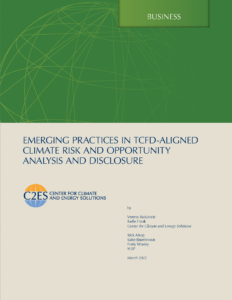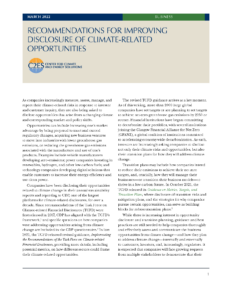While companies are increasingly disclosing climate-related risks and opportunities under the Task Force for Climate-related Financial Disclosures (TCFD) framework, they are experiencing challenges in articulating financial impact using scenario analysis. Scenario analysis is a complex exercise requiring specific climate data, as well as a technical understanding of assets and the business. Further, the lack of significant precedent toward disclosure of climate-related financial impact means that many companies are hesitant toward disclosing the detailed results of scenario analysis.
The Center for Climate and Energy Solutions (C2ES), in collaboration with member companies in its Business Environmental Leadership Council (BELC) and a few additional companies, conducted a study of current practices pertaining to climate-related scenario analysis, how companies are determining financial impact of climate-related risks and opportunities, how they are taking action on these impacts, and how they are disclosing this information. The results of the study are intended for use by companies to help them conduct more in-depth and decision-useful analysis of climate-related risks and opportunities.
Publications
 |
Report: Emerging Practices in TCFD-aligned Climate Risk and Opportunity Analysis and DisclosureWe interviewed 19 companies, and conducted literature reviews and collaborative workshops. We analyzed practices under four focal areas: how are companies measuring, assessing, managing, and disclosing climate-related risks and opportunities? This report presents the in-depth results of that study. We present, aligned with the four focal areas:
|
 |
Brief: Recommendations for Improving Disclosure of Climate-Related OpportunitiesThese recommendations synthesize the TCFD’s 2021 guidance on disclosing climate-related opportunities for select industrial sectors; compares the most recent disclosure guidance to companies’ actual disclosure from 2021 CDP reports; and provides recommendations in alignment with, and in addition to, the TCFD for further enhancing disclosure of climate-related opportunities, especially for these sectors. |
Toolkit: Assessing Physical Risks
This toolkit is intended to assist companies in understanding what types of data and information providers are available in undertaking physical climate risk assessment. This toolkit is primarily focused on US-based information and features publicly available resources, drawn from federal and academic sources. Several tools that are well-used by both private and public stakeholders are also included. C2ES does not necessarily endorse the proprietary, private resources that incorporate publicly available government-provided data listed under the “Organizations and Providers” tab. This tool serves to generally identify further analysis resources for companies.
Webinars
As more companies are beginning to disclose their climate-related risks and opportunities in response to interest from investors and regulators, improved guidance and best practices are needed to help companies measure and assess transition risks and opportunities under different scenarios.
Foresight is 20/20: Assessing Opportunity and Disclosing Transition Risk for a Net-zero Future
Stranded assets, reputational impacts, regulatory changes, and lack of market access each may impact companies unprepared for a transition to a low-carbon economy. Current C2ES research aims to accelerate and scale knowledge within companies to create better awareness of climate-related risks across business units and to align internal action towards decarbonization and external stakeholder engagement.
In this webinar, TCFD Secretariat and global mining company BHP will detail approaches to transition risks and opportunities, especially considering policy developments and investor commitments in support of a net-zero, resilient future.
Foresight is 20/20: Understanding Physical risk in a Climate-Impacted Future
A 2020 C2ES report found that TCFD guidance for evaluating physical risk is less robust than for transition risk and that new tools and continued information sharing are vital to enable investor decision-making that accounts for climate risk.
This webinar examines how different companies and organizations are assessing their forward-looking physical risks from a changing climate and developing resources to assist companies and investors.
